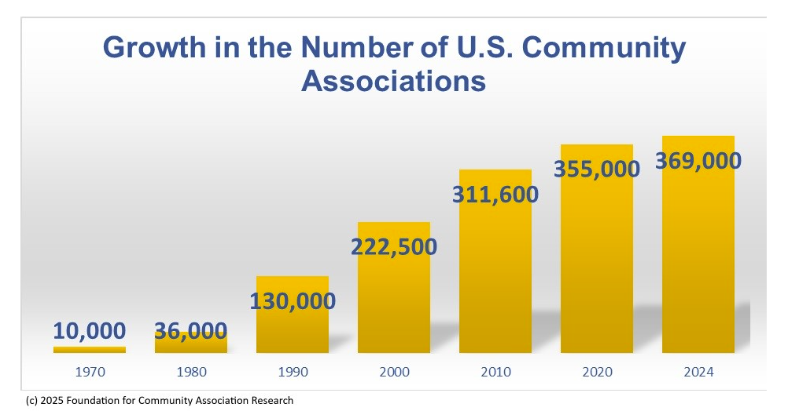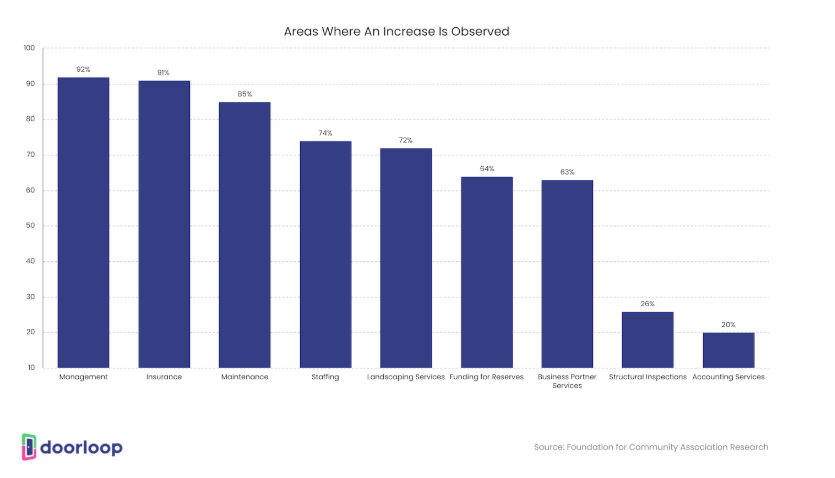Are HOA Communities Becoming More Popular?
January 6, 2025

Homeowner association communities (HOAs) have been gaining popularity in recent years, and there’s no sign that this trend is slowing down. In 2024, there were approximately 369,000 homeowner associations across the country, an increase from 355,000 just four years prior. According to the Foundation for Community Association Research, over 30% of the U.S. housing stock was part of an HOA community in 2023. In Virginia, there are 811,399 housing units governed by homeowner associations. What seems to be driving up the popularity of HOAs and what does this mean for the housing market?

Pros & Cons
Although people often criticize HOAs for their rules and regulations, the advantages they provide lead many to overlook these concerns.
The main benefits of living in a HOA community are:
- Well-maintained neighborhoods
- Shared amenities
- Increased property value
- Conflict resolution
- Security features
The rules enforced by HOAs play a crucial role in maintaining well-kept and visually appealing communities. Typically, HOAs establish landscaping guidelines that all residents must follow; in some areas, they handle most landscaping needs themselves. Many associations provide shared amenities such as pools, gyms, parks, clubhouses, and more. Whether they employ private security or organize a neighborhood watch, HOAs contribute to a sense of safety within the community. Residents also seek a sense of belonging in their neighborhoods. To promote this, associations often host events and social gatherings at their shared amenities, encouraging face-to-face interactions among residents. All of these features not only enhance the quality of life in the community but also help protect and increase property values for homeowners.
As stated before, HOAs face common criticisms such as
- Fees and assessments
- Management dissatisfaction
- Restrictive rules
HOAs come with some perks, but they can be pretty pricey depending on where you live. Residents have to pay monthly dues to their HOA, and if you miss a payment, you could rack up late fees and interest. Plus, not paying can cut you off from shared amenities, lead to a lien on your property, or even get you into collection trouble—potentially leading to foreclosure in extreme cases.
That said, these monthly fees tend to creep up over time since maintenance costs are rarely stable. Homeowners also have to follow certain rules about what they can and can’t do with their homes, which can vary from landscaping choices to exterior paint colors.
People generally feel strongly one way or the other about HOAs. A study by Front Door found that 60% of residents had a good experience with their HOA, while 54% had a bad one. Common complaints from the unhappy residents included high fees, rules that weren’t enforced consistently, and poor communication from the HOA board.
Cost Trends
According to the U.S. Census Bureau, the national average HOA fee in 2023 was $243 per month, totaling about $2,916 for the year. Additionally, the Foundation for Community Association Research reported that the average monthly HOA fee in Virginia was $325 per month or $3,895 annually. This places the commonwealth among the top 10 states with the highest HOA fees, according to their study. Inflation has played a significant role in the rise of HOA fees.

In conclusion, although HOAs have both upsides and downsides, associations are still growing rapidly. The U.S. Census Bureau reported that 65% of newly constructed single-family homes were built within HOA communities, an increase from 49% in 2009. The benefits of a well-kept neighborhood, shared amenities, and overall convenience will always attract potential buyers and renters. Real estate professionals should keep a close eye on HOA trends, as associations are likely to play a prominent role in the housing market in the future.
You might also like…
Key Takeaways from NAR’s 2024 Profile of Home Buyers and Sellers
By Sejal Naik - December 9, 2024
The National Association of REALTORS® recently released its annual profile of home buyers and sellers. This report summarizes the results from a survey of recent home buyers and… Read More
Virginia’s Labor Market: Growing Sectors and Their Impact on Real Estate
By Abel Opoku-Adjei - November 4, 2024
Virginia boasts one of the strongest labor forces in the country. As of September 2024, there are 4.25 million jobs in the state, according to the Bureau of… Read More
Buyer Broker Agreement: When Do I Need One?
By Santiago Montalvo - September 6, 2024
Let’s begin with when you do NOT need one. You sign a listing agreement with a now seller and someone calls you and asks you to show that… Read More